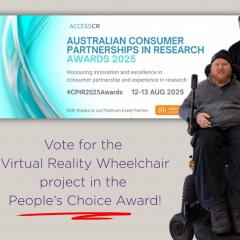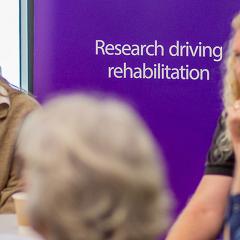What is the research about?
Communication disorders are impairments in the ability to communicate effectively that may involve speech impairment characterised by slurred and indistinct speech (dysarthria or apraxia of speech), specific language impairments characterised by difficulties with comprehension or expression of language (aphasia), communication difficulties associated with cognitive disorders, and impaired social communication skills.
As the availability of mobile technology increases, apps have the potential to increase the reach of allied health interventions by making therapy available anywhere that a mobile device can be used. However, ensuring apps are evidence-based and high-quality is critical for facilitating safe and effective treatment for adults with communication disorders.
This research aims to identify and evaluate the quality of available apps available for adults with communication disorders.
Who would benefit from the research?
The research findings are relevant to individuals with communication disorders, service providers in speech-language therapy, and those interested in the design and development of mobile apps as a clinical rehabilitation tool for speech-language therapy.
What did the researchers do?
To identify mobile apps, the research team conducted a search on Google Play and Apple App Store using keywords related to speech-language therapy for adults. The apps had to be in English and readily available to consumers via online app stores.
Seventy mobile phone apps identified that targeted language, speech, voice, cognitive-communication, and numeracy. Each app was scored by certified speech pathologists using the Mobile Application Rating Scale across several domains, including how engaging they are, their functionality, aesthetics, the information included and their perceived quality and impact.
What did the researchers find?
- The apps scored an average of 3.7/5 on the MARS scale
- Most apps (86%) were rated as acceptable (3 out of 5).
- Most apps prioritised functionality (mean score 4.3) over the other domains (mean scores 3.3 – 3.8)
- The engagement domain was unexpectedly low (mean score 3.3/5)
- There was limited evidence-based research for the clinical benefits of the apps.
How can you use this research?
This review showed that available apps appeared to favour functionality over aesthetics, information and engagement. This was surprising given the long-term engagement in speech-language therapy commonly required to gain real health benefits. The details of the app’s scores and functionalities included in the manuscript.
The findings of this study have a number of recommendations and practical implications for the future development of apps designed to assist people with communication disorders:
- Incorporating game design elements in the app to enhance engagement in therapy
- A multidisciplinary approach should be taken to Implement a human-centred and co-design process for developing mobile apps involving consumers and all stakeholders to ensure apps tailored to targeted goals.
- Including subject matter expert ratings for mobile health apps to provide a more reliable measure of the app’s quality
- Professional bodies such as Speech-Language Pathology associations establish a database where app developers could register their apps.
About the researchers
 Dr Atiyeh Vaezipour, Human-Computer Interaction research fellow at RECOVER Injury Research Centre with the expertise in design, development and evaluation of innovative rehabilitation technology solutions to improve the delivery and availability of evidence-based health services.
Dr Atiyeh Vaezipour, Human-Computer Interaction research fellow at RECOVER Injury Research Centre with the expertise in design, development and evaluation of innovative rehabilitation technology solutions to improve the delivery and availability of evidence-based health services.
Dr Jessica Campbell is a certified practising speech pathologist and research fellow at the Queensland Aphasia Research Centre.
Emeritus Professor Deborah Theodoros is an internationally recognised scholar in the fields of speech pathology and telehealth.
Professor Trevor Russell is an internationally recognised scholar in the fields of physiotherapy and telerehabilitation.
Citation
Vaezipour A, Campbell J, Theodoros D, Russell T. Mobile Apps for Speech-Language Therapy in Adults With Communication Disorders: Review of Content and Quality. JMIR Mhealth Uhealth 2020;8(10):e18858. URL: https://mhealth.jmir.org/2020/10/e18858. DOI: 10.2196/18858
Keywords
Communication disorders; Speech Therapy; Language therapy; Rehabilitation; Mobile health; mHealth; Human Factors
Contact information
Dr Atiyeh Vaezipour
Email: a.vaezipour@uq.edu.au
Twitter: AtiVaezipour



